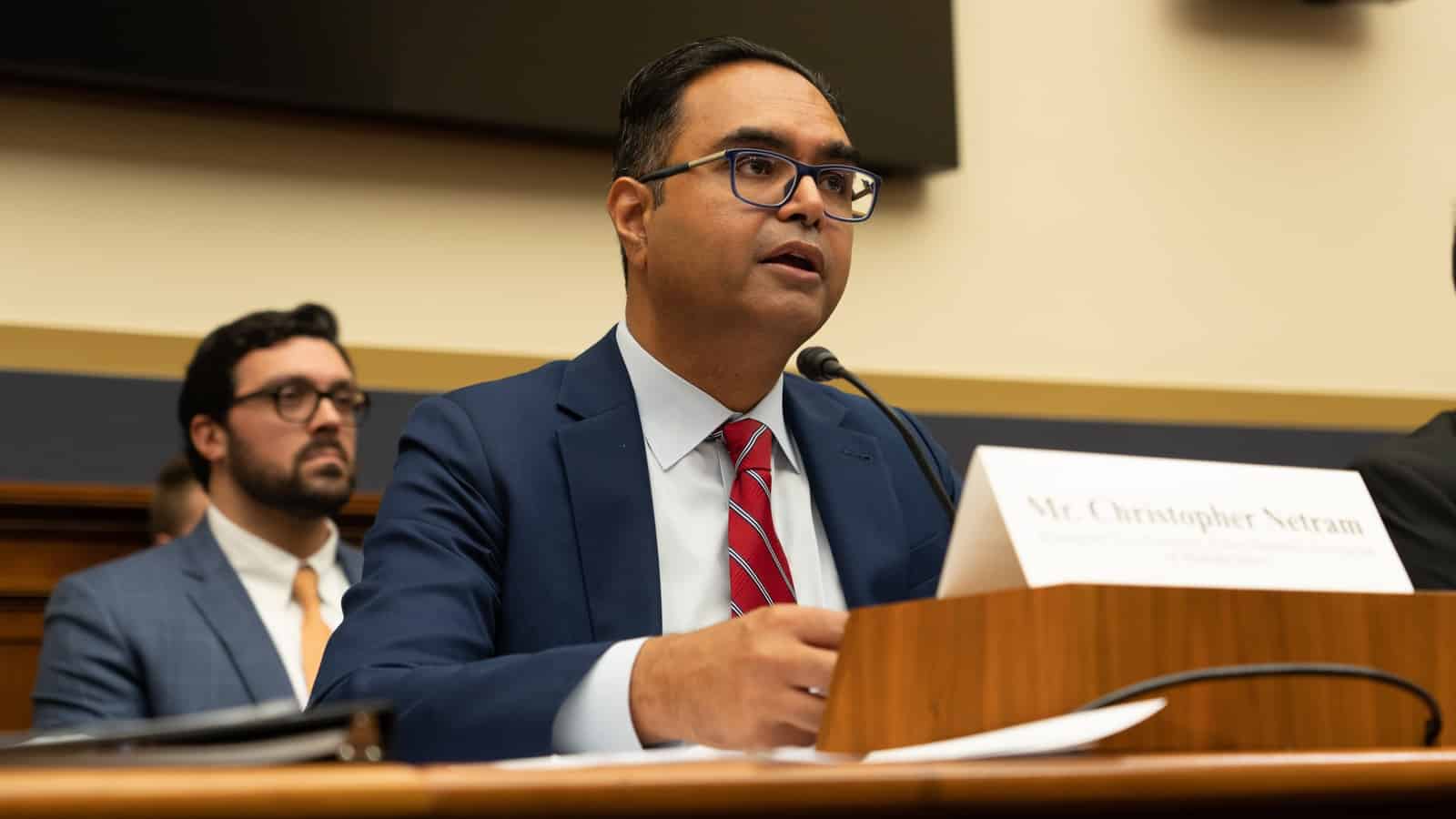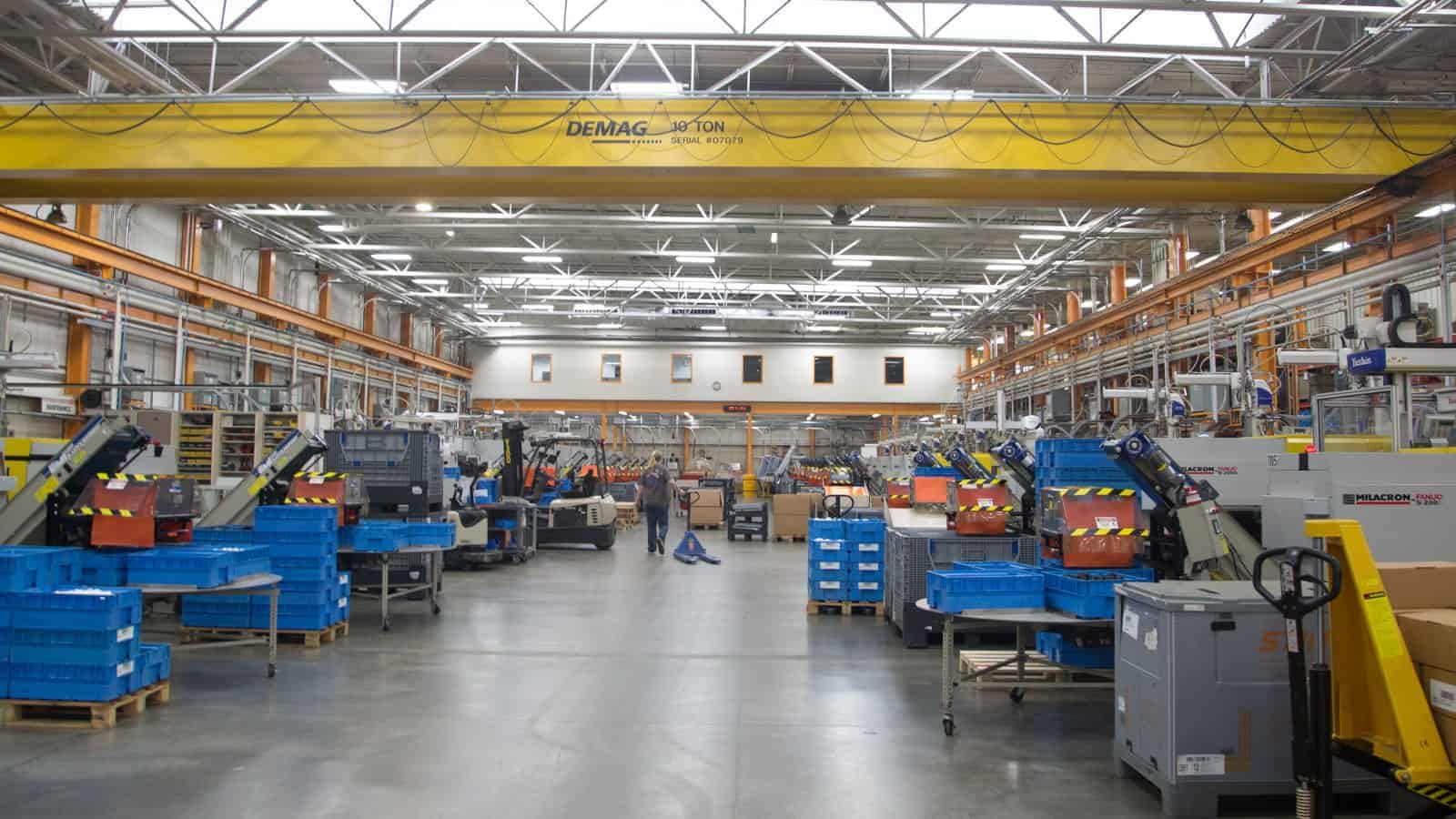Ohio Grapples with EPA Air Quality Rules

For Michael Canty, president and CEO of Alloy Precision Technologies, Inc., of Mentor, Ohio, the Environmental Protection Agency’s proposed air quality regulations are likely to backfire. They would put a significant burden on the natural gas industry, which has played a large part in America’s efforts to reduce pollution to date.
- “Natural gas is a fossil fuel, but it’s one of the cleanest fossil fuels,” said Canty. “It’s one of the reasons why this country has met clean air standards over the years.”
This is just one of the reasons why Canty, whose company produces industrial bellows, is concerned that policymakers haven’t fully considered the rules’ consequences.
Unintended consequences: Part of the problem with the EPA’s proposed regulations, according to Canty, is that they are likely to promote production in less regulated countries around the world and contribute to more emissions overall.
- “With some of these costly regulations, we’re driving our energy prices to a much higher level and driving production of business to places like China that are creating more emission,” said Canty. “So we’re creating worse air quality control around the world while losing jobs and stifling growth in our country.”
A push for innovation: Canty wants policies that spur innovation and tech development to achieve cleaner air, rather than imposing restrictive regulations.
- “The focus should be on encouraging new technology to drive efficiencies and reduce air pollutants,” said Canty. “If the cost of doing business goes up, you have less cash to put in that innovation. As the cost of energy goes up, the amount of energy innovation goes down—especially when you talk about small businesses.”
A plea for consistency: Businesses like Alloy Precision Technologies are also frustrated by the unstable regulatory environment, which seems to shift every few years.
- “When these policies change it makes it impossible for companies to make decisions about investing in equipment and smart manufacturing,” said Canty. “It disrupts the business marketplace, and it greatly affects our ability to produce and compete around the world.”
The last word: “Do I believe we ought to continue investing in newer technologies that will improve our air quality? Absolutely,” said Canty. “These regulations are well meant, but the end result will be disastrous for businesses and the United States.”
West Virginians Push Back on Stricter EPA Air Standards

Jason Asbury wants to clear up a misunderstanding.
The vice president for geotechnical and field services at TERRADON Corporation—the largest woman-owned engineering business in West Virginia—knows that West Virginia’s leadership in the energy industry has created a negative stereotype about West Virginians and environmentalism. But he also knows that the reality is very different.
- “There’s a misconception that we don’t care about the environment, and that couldn’t be further from the truth,” said Asbury. “We’re some of the most outdoorsy people you’ll ever meet, and we care about nature, about the mountains, the waterways, the clean air—that’s why we live here. This is home for us, and we feel a duty to make sure that everything we do protects the environment.”
But as the Environmental Protection Agency considers a more restrictive standard for clean air, Asbury is also warning that the rule is unrealistic and ultimately harmful, and that it will cause painful repercussions in West Virginia and beyond.
A strict standard: The EPA rule under consideration, which would govern particles known as PM2.5, would impose additional tight regulations on manufacturers and others across the country. According to Asbury, those regulations would harm businesses without resulting in real benefits.
- “It’s potentially overkill,” said Asbury. “Everybody in sectors from engineering to construction and manufacturing is doing all they can to ensure we have clean air—but we’re trying to balance having clean air with being profitable and having jobs and economic growth in our communities. Groups like ours are already working toward environmental goals, and this rule hinders that.”
A heavy burden: The EPA’s proposed rule would impose significant costs and delays for companies, Asbury continued.
- “It’s more burdensome on the permitting and regulatory side to attempt to meet a standard that may or may not be attainable,” said Asbury. “That causes design overruns and more costly projects.”
- “It causes us to miss deadlines and push projects back. If projects get canceled, we’re laying off staff. And if folks don’t want to go through this extra layer of regulation, then there’s a potential for bigger job losses in the community.”
A message to policymakers: Asbury wants policymakers to understand that these rules aren’t just about numbers on a spreadsheet; they have real human consequences.
- “Have you ever tried to do what you’re asking others to do?” said Asbury. “Have you ever tried to run a project under these regulations? Have you ever had to tell people that they don’t have a job due to a project being killed because of regulations like this one? It’s easy to make these rules when you’re not responsible for signing the front of a check.”
Overregulation Hurts Manufacturing

Manufacturing is booming in Ohio, as payrolls swell and economic output in the sector breaks records—but continued success could be in jeopardy if Washington continues its current regulatory onslaught, Ohio Manufacturers’ Association President Ryan Augsburger writes in a recent Cleveland Plain Dealer (subscription) op-ed.
What’s going on: “The latest survey conducted by the National Association of Manufacturers (NAM) finds that U.S. manufacturers’ concerns over federal regulations have reached a six-year high as nearly 100 new major regulations—from 30 federal agencies and offices—threaten jobs and investment,” Augsburger notes.
- In the next year, the Biden administration plans to issue even more regulations—approximately 3,200, including about 280 “major rules” and 1,326 “significant rules.”
- Meanwhile, “More than 63% of manufacturers are spending more than 2,000 hours per year complying with federal regulations, diverting resources that would otherwise go towards employee compensation, new hires and additional investment in U.S. facilities,” Augsburger writes, citing the NAM’s Q2 2023 Manufacturers’ Outlook Survey.
Why it’s important: All these rules will cost manufacturers dearly, according to Augsburger, who highlights a few particularly burdensome regulations, including:
- The Environmental Protection Agency’s proposed particulate matter rule, which is expected to cost “up to $197.4 billion in U.S. economic activity and endanger as many as 973,900 current U.S. jobs”;
- The Securities and Exchange Commission’s proposed climate-disclosure requirement, which the NAM recently advocated against in testimony before the House; and
- The Federal Trade Commission’s proposal to ban noncompete agreements, which 70% of manufacturers use to safeguard their intellectual property.
What can be done: The NAM and the Ohio Manufacturers’ Association have been in contact with the White House to coordinate the designation of a senior adviser, who will work to ensure that the regulations put forth align with President Biden’s promise to promote manufacturing.
The final say: “Time and again, we’ve seen regulatory uncertainty and over-regulation stymie new hiring and kill manufacturing jobs. When the U.S. does not manufacture, investment shifts to other countries that do not share our commitment to environmental stewardship and worker safety,” Augsburger said.
NAM Testifies at ESG Hearing

The House Financial Services Committee held a hearing yesterday titled “Reforming the Proxy Process to Safeguard Investor Interests”—and NAM Managing Vice President of Policy Chris Netram was there to represent manufacturers. The committee is in the middle of a monthlong series of hearings on environmental, social and governance topics and other issues related to the proxy process.
The background: Manufacturers often face challenges from politically motivated activists who use the proxy voting process to gain attention for issues unrelated to the companies’ success, and from a Securities and Exchange Commission that has empowered these activists.
The topline: At the hearing, Netram called on Congress to rein in the SEC’s regulatory overreach, keep activists out of the boardroom and protect Americans’ investments in manufacturing growth.
- “Focusing on financial returns helps businesses grow and safeguards investors’ retirement security,” said Netram. “But in recent years, third parties have hijacked the proxy process to distract companies from this duty: activists use the proxy ballot to advance political and social agendas, proxy firms dictate corporate governance decisions, and the SEC is empowering these groups—while also proposing ESG disclosure mandates of its own.”
Depoliticizing corporate governance: Netram called on Congress to stop activists from abusing the proxy ballot to pursue social and political agendas. That means preventing the SEC from forcing companies to include irrelevant proposals on their ballots, and instituting further reforms like making it harder for activists to resubmit the same unpopular proposals regularly.
- “Turning the proxy ballot into a debate club diverts time and resources away from shareholder value creation and forces companies to wade into controversial topics over which they have no control,” said Netram. “Congress must prevent the SEC from forcing companies to include irrelevant proposals on their ballots.”
Reining in proxy advisory firms: Netram spoke about the need to restrict the outsized influence that proxy advisory firms exercise on corporate governance, including by protecting investors from conflicts of interest, enforcing antifraud standards, limiting robo-voting and requiring proxy firms to engage with impacted businesses.
- “Despite their power, proxy firms operate with minimal regulatory oversight—and the SEC has rescinded modest protections that were adopted in 2020 to inform and protect investors,” said Netram. “This means that the firms’ conflicts of interest, errors and lack of transparency go largely unchecked.”
Pushing back on ESG disclosure mandates: Netram also called on Congress to limit the SEC’s ESG reporting rules by requiring only material disclosures from public companies rather than demanding far-reaching information that increases costs for manufacturers and overwhelms investors.
- “Investors need material information to make informed investing decisions and grow their retirement savings,” said Netram. “Instead, the SEC has proposed far-reaching mandates that won’t inform investors—but will harm manufacturers. Congress must limit the SEC’s regulatory onslaught.”
The last word: “Politically motivated activists are pursuing inflexible ESG agendas with little regard to their impact on everyday Americans’ financial security—and the SEC is increasingly a partner in their effort,” said Netram.
- “If this trend is allowed to continue, then small manufacturers will be hardest hit. I’ve spoken to NAM members who are deeply concerned about potentially losing public company customers or facing insurmountable regulatory costs because they just can’t keep up with ESG.”
California Agriculture Workers Warn Against EPA Proposal

Manufacturers have long been leaders in sustainability, as have their partners in the agricultural industry. But as the Environmental Protection Agency considers imposing new restrictive air standards, groups across the country are speaking out in opposition.
In California, a group called the Nisei Farmers League is making noise.
Formed by a small group of Japanese American growers in 1971 as a “mutual protection society,” the NFL has become a well-respected organization committed to serving the needs of growers, farm workers and other members of the agriculture community in California. Today, they are sounding the alarm about a proposed EPA rule that would enforce a tighter national ambient air quality standard for fine particle pollution known as PM2.5—a move that could impact everything from permitting to international competition.
Widespread impacts: According to NFL President Manuel Cunha Jr., the regulations could be devastating for growers in California and farmers across the country.
- “There are issues with this regulation that the public just doesn’t realize,” said Cunha. “It impacts jobs. It impacts our ability to move freight. If you think the cost of food is high today, it will be even higher if this rule goes into effect.”
A closer look: Cunha knows the impacts of regulations like this one firsthand. He tells the story of a colleague who uses machinery to dehydrate fruits like apricots and peaches, but whose machinery would be unaffordable if he was forced to adhere to the stricter standard.
- “If they come out with a new standard, he’ll have to shut down,” said Cunha. “He can’t afford to build new equipment—the cost is unsustainable. It’s not economically feasible. And that’s what they’re telling our farmers to do.”
Impeding growth: Rapid shifts in environmental standards have also made it difficult for growers and other members of the agricultural community to adjust and succeed.
- “These standards keep changing, and it’s impossible to keep up,” said Cunha. “Our area in the San Joaquin Valley has seven plans with the EPA that are waiting for approval, and every time we turn around, there is another standard holding us back.”
- Meanwhile, strict standards imposed on other parts of the supply chain create costs that get passed along to farmers.
A message to policymakers: Cunha is speaking out because he wants policymakers to think about the realities of the proposed rule—including the costs that states will bear and the ripple effects throughout the agricultural supply chain.
- “How do we keep jobs?” said Cunha. “How do we keep our rural communities alive if you’re developing rules that don’t have the facts and the science behind them? Politicians are going on the basis of what looks and sounds good, but you have to realize that what you’re doing is driving out small farmers.”
NAM Hits Back at Price Controls in PAHPA Draft

The Pandemic and All-Hazards Preparedness Act, which expires at the end of September, is critical to public-health emergency readiness. Yet, a Senate bipartisan discussion draft to reauthorize it contains some provisions that are troubling to manufacturers, the NAM told the Senate Committee on Health, Education, Labor & Pensions this week.
The background: The Senate released a draft of a bill last week to reauthorize PAHPA, a measure passed in 2006 with the intention of ensuring national readiness for public-health emergencies.
Imposing price caps: The draft contains a requirement to cap the cost of any product that has received support from either the Centers for Disease Control and Prevention or the Biomedical Advanced Research and Development Authority “at the lowest price charged for such … product[s]” among the G7 countries (the U.S., Canada, France, Germany, Italy, Japan and the United Kingdom).
- Such a move would erase the advances made over the decades since the 1980 passage of the Bayh-Dole Act, which created mutually beneficial economic partnerships between the federal government, universities and private industry, NAM Managing Vice President of Policy Chris Netram said in his message to the committee.
- A price limit “would reduce the positive impact of the Bayh-Dole Act by imposing price controls on products developed through the innovation spurred by these partnerships,” he said.
Deterring innovation: Pricing controls also threaten continued scientific advancements of the sort that have cured once-prevalent diseases and solved “some of the world’s most prevalent and challenging health issues,” Netram continued.
- “The development of new medicines demands tremendous financial investment, many years of intensive effort and a willingness to accept significant risk. While public–private partnerships are important in stewarding new drugs to market, pharmaceutical companies bear almost the entire cost of discovering new drugs, ushering them to approval and scaling them through manufacturing.”
- In 2019, the pharmaceuticals industry invested more than $83 billion in the research and development of new drugs, Netram said, citing Congressional Budget Office data.
Stopping the flow of medication: Perhaps most concerningly, setting cost caps on drugs also jeopardizes the flow of medications to those who need them, Netram told the committee.
- “Price controls … restrict the supply of medicines to patients,” Netram concluded. “As such, price control language should be excluded from the PAHPA.”
NAM to Congress: Protect Manufacturers from SEC Overreach and ESG Activists

Manufacturers across the United States are driving economic expansion while also supporting sustainable business practices, enhancing diversity in the workforce and combatting climate change. Yet, politically motivated activists threaten to slow this progress by insisting on their own narrow agendas. Recent actions by the Securities and Exchange Commission will empower these groups and divert resources from manufacturers’ investments in job creation and business growth.
As the Financial Services Committee in the House of Representatives begins a monthlong hearing series on environmental, social and governance topics and other issues related to the proxy process, NAM President and CEO Jay Timmons is calling on Congress to rein in the SEC’s regulatory overreach and keep activists out of the boardroom.
Depoliticizing corporate governance: Activists on the left and right are increasingly abusing the proxy ballot to advance narrow social and political agendas. The SEC has taken steps in recent years to support and empower these activists.
- The NAM is suggesting reforms to the rules governing shareholder proposals that will prevent activists from hijacking the proxy ballot in pursuit of political agendas unrelated to long-term business growth and shareholder value creation.
Reining in proxy advisory firms: Despite their significant conflicts of interest, errors and lack of transparency, proxy firms exercise outsized influence on corporate governance. More oversight and accountability are needed to protect manufacturers and Main Street investors from these powerful actors.
- The NAM is pressing Congress to ensure that proxy firms are regulated appropriately by the SEC—including by requiring that the firms disclose and manage their conflicts of interest and allow companies to review their draft recommendations.
Protecting Main Street investors: In the face of pressure from ESG activists and proxy firms, the financial institutions that manage Americans’ 401(k) accounts and pension plans must take steps to protect these Main Street investors’ retirement savings.
- The NAM is calling on lawmakers to ensure that asset managers cast proxy votes and make investing decisions solely in Main Street investors’ financial best interests—and without over-relying on proxy firms and ESG ratings organizations.
Limiting ESG disclosure mandates: The SEC’s aggressive ESG rulemaking agenda will increase costs and liability for manufacturers and overwhelm investors with a deluge of irrelevant information.
- The NAM is urging Congress to limit any SEC disclosure mandates to information that is material to shareholders’ investing and voting decisions.
The last word: “Congress must step in to depoliticize the business decisions that impact the lives and life savings of millions of Americans,” said Timmons. “Manufacturers are determined to create jobs, lead the economy and improve the quality of life for all Americans. We are counting on [Congress’] leadership to counter the SEC’s regulatory overreach and help us achieve these goals.
NAM to Congress: Protect Manufacturers from SEC Overreach and ESG Activists

Manufacturers across the United States are driving economic expansion while also supporting sustainable business practices, enhancing diversity in the workforce and combatting climate change. Yet, politically motivated activists threaten to slow this progress by insisting on their own narrow agendas. Recent actions by the Securities and Exchange Commission will empower these groups and divert resources from manufacturers’ investments in job creation and business growth.
As the Financial Services Committee in the House of Representatives begins a monthlong hearing series on environmental, social and governance topics and other issues related to the proxy process, NAM President and CEO Jay Timmons is calling on Congress to rein in the SEC’s regulatory overreach and keep activists out of the boardroom.
Depoliticizing corporate governance: Activists on the left and right are increasingly abusing the proxy ballot to advance narrow social and political agendas. The SEC has taken steps in recent years to support and empower these activists.
- The NAM is suggesting reforms to the rules governing shareholder proposals that will prevent activists from hijacking the proxy ballot in pursuit of political agendas unrelated to long-term business growth and shareholder value creation.
Reining in proxy advisory firms: Despite their significant conflicts of interest, errors and lack of transparency, proxy firms exercise outsized influence on corporate governance. More oversight and accountability are needed to protect manufacturers and Main Street investors from these powerful actors.
- The NAM is pressing Congress to ensure that proxy firms are regulated appropriately by the SEC—including by requiring that the firms disclose and manage their conflicts of interest and allow companies to review their draft recommendations.
Read the full story here.
NAM Doubles Down on PRO Act’s Dangers

The Protecting the Right to Organize Act would “devastate workplaces” if enacted, the NAM told the Senate this week.
What’s going on: The PRO Act—introduced in February by Rep. Robert C. Scott (D-VA) purportedly to expand labor protections—would do significant harm to manufacturers, NAM Director of Labor and Employment Policy Brian Walsh told Committee Chairman Bernie Sanders (I-VT) and Ranking Member Bill Cassidy (R-LA) Tuesday.
What it would do: The PRO Act contains “proposals that would constitute the most radical rewrite of our nation’s employment laws in nearly 100 years,” including:
- Removal of the right to a secret ballot in union elections and the institution of “card check”
- Elimination of right-to-work statutes in the 27 states in which they are law
- Forced payment of union due even by non-union-supporting employees
- A ban on employers talking to their workers about unions without the involvement of a union representative
What should be done: Walsh urged the committee members “to oppose this misguided attempt to fundamentally restructure American workplaces” and instead put their support behind measures that truly support employees.
- “We look forward to opportunities to continue working with members of the [c]ommittee … on legislation such as the Employee Rights Act (S. 1201) to advance productive solutions that meet the needs of today’s workers,” he said.
Manufacturing Associations Launch Coalition to Curb Regulatory Onslaught in Washington
Sector Requests Senior-Level Adviser Designated to Coordinate Efforts Among Agencies Within the White House
Washington, D.C. – Today, the National Association of Manufacturers, members of the NAM’s Council of Manufacturing Associations and Conference of State Manufacturers Associations launched Manufacturers for Sensible Regulations, a coalition addressing the impact of the current regulatory onslaught coming from federal agencies.
According to the NAM’s Q2 2023 Manufacturers’ Outlook Survey, more than 63% of manufacturers report spending more than 2,000 hours per year complying with federal regulations, while more than 17% of manufacturers report spending more than 10,000 hours.
“President Biden and Congress have prioritized strengthening the manufacturing sector in America through historic legislation like the Bipartisan Infrastructure Law, the CHIPS and Science Act, initial permitting reform actions in the Fiscal Responsibility Act and even some energy provisions in the Inflation Reduction Act,” said NAM President and CEO Jay Timmons. “Unfortunately, the continued onslaught of regulations is having a chilling effect on investment, curtailing our ability to hire new workers and suppressing wage growth, especially for small and medium-sized manufacturers. The recently released regulatory agenda from the administration shows this barrage isn’t stopping.”
“Washington is creating tremendous doubt across our sector at a time when we’re still dealing with economic uncertainty. And the unbalanced regulations coming out of this administration threaten to undermine our ability to grow, compete and win on a global scale,” said American Cleaning Institute President and CEO, NAM board member and CMA Chair Melissa Hockstad. “We want President Biden’s manufacturing agenda to succeed. Unfortunately, we are seeing the signs that the regulatory agenda is jeopardizing the investments enacted over the past 18 months.”
“U.S. pulp and paper manufacturers recognize the need to address the challenges of our changing climate and share the administration’s goal to secure a more sustainable future,” said American Forest & Paper Association President and CEO Heidi Brock. “This can only be achieved by working with—not against—manufacturers to craft achievable and balanced regulations that address environmental challenges without threatening manufacturing jobs.”
“Manufacturers have proven to be extraordinarily resilient in recent years, leading Utah and the entire country coming out of the pandemic and through times of geopolitical turmoil,” said Utah Manufacturers Association President and CEO, NAM board member and COSMA Chair Todd Bingham. “But the regulatory agenda currently coming out of our nation’s capital has the potential to derail the gains we’ve made during this administration. We will work with our state partners and the White House to find solutions to help grow our sector in the most responsible way possible.”
The NAM survey also highlighted that only 67% of manufacturers are positive about their own company’s outlook, the lowest since Q3 2019. It shows the consequences of regulations: If the regulatory burden on manufacturers decreased, 65% of manufacturers would purchase more capital equipment, and more than 46% would increase compensation.
The group has been meeting with key members of the Biden administration and Congress to highlight the devastating impact of unbalanced regulations.
-NAM-
The National Association of Manufacturers is the largest manufacturing association in the United States, representing small and large manufacturers in every industrial sector and in all 50 states. Manufacturing employs nearly 13 million men and women, contributes $2.90 trillion to the U.S. economy annually and accounts for 55% of private-sector research and development. The NAM is the powerful voice of the manufacturing community and the leading advocate for a policy agenda that helps manufacturers compete in the global economy and create jobs across the United States. For more information about the NAM or to follow us on Twitter and Facebook, please visit www.nam.org.
-CMA-
With a membership including 260 national manufacturing trade associations representing 130,000 companies worldwide, the Council of Manufacturing Associations creates partnerships across the industry, amplifies manufacturers’ voices and connects members to experts and trade association executives. CMA members gain insights, share perspectives, form coalitions and ensure manufacturers have a strong voice in national policy.
-COSMA-
Members of the Conference of State Manufacturers Associations serve as the NAM’s official state partners and drive manufacturers’ priorities on state issues, mobilize local communities and help move federal policy from the ground up in all 50 states and Puerto Rico.
